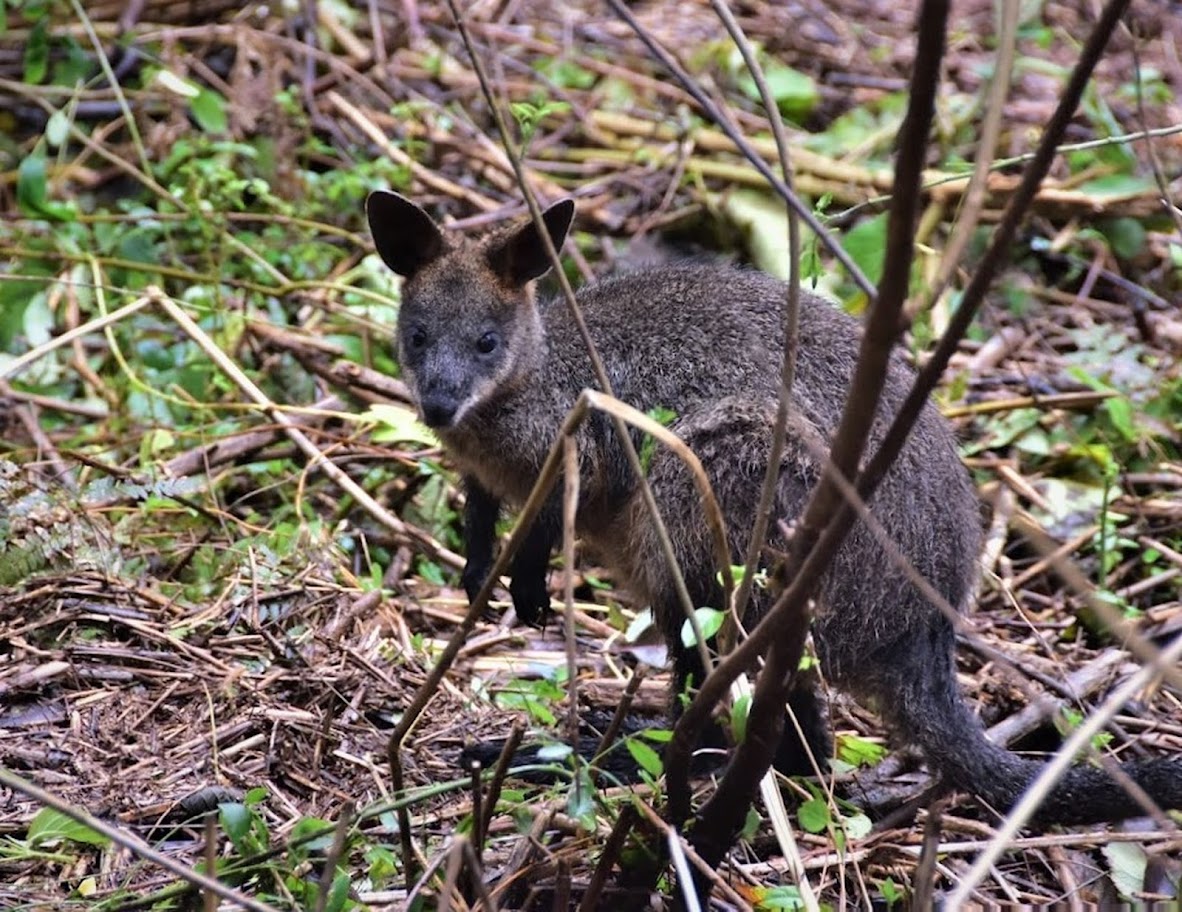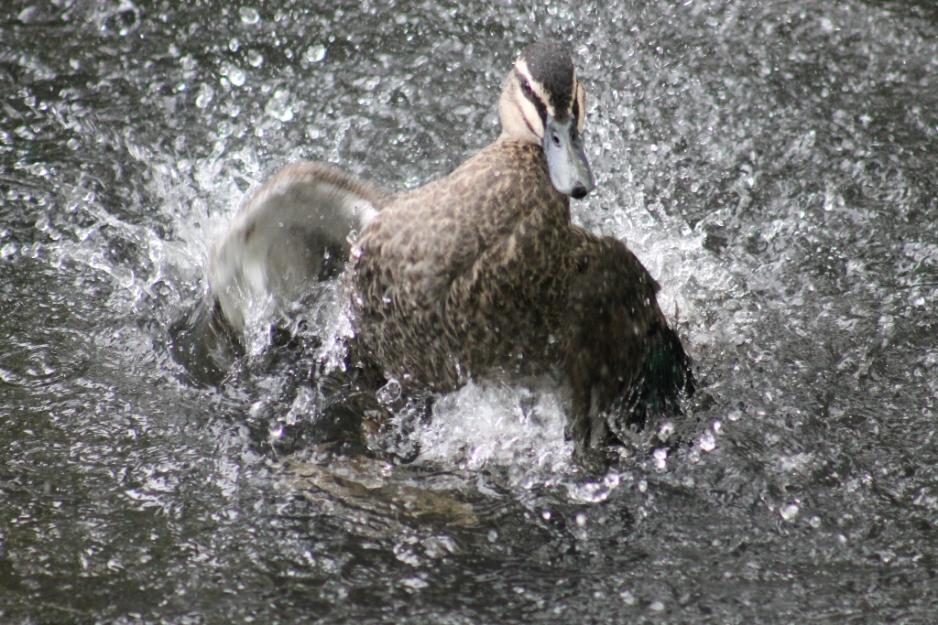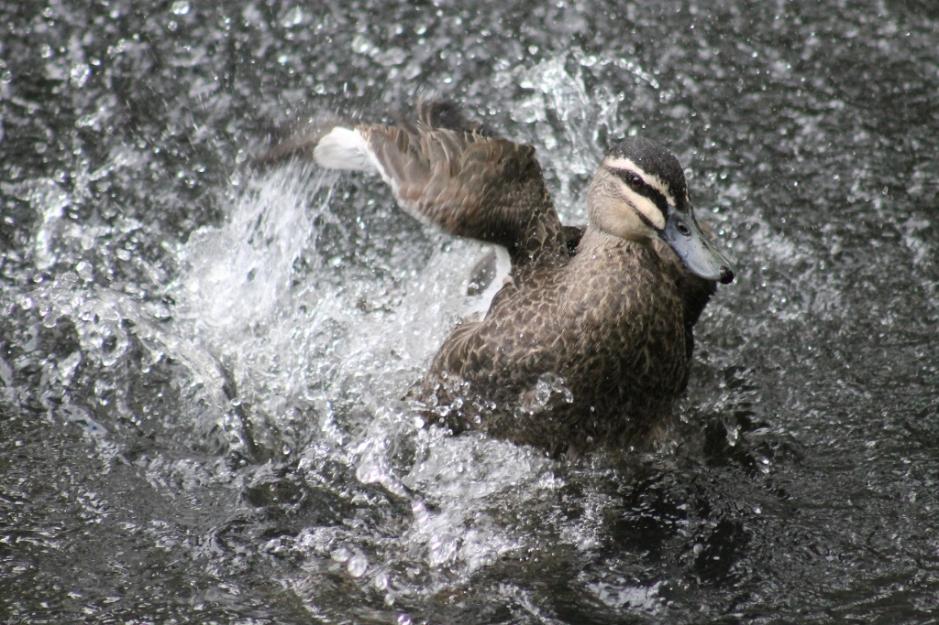January 1 - 31, 2025: Issue 638
Wildlife killed by Same roaming dog Pair Again: 2025 Review of NSW Companion Animals Act to Commence following Dog Attack Inquests
Dogs killing wildlife at: North Narrabeen-Elanora-Ingleside-Warriewood - January 2024
Residents have reported that a pair of dogs witnessed killing a water dragon in 2023 are once more on the loose in North Narrabeen, Elanora and Ingleside.
On Wednesday January 15 2025 one of the pair was seen with another dead water dragon dangling from its mouth.
One resident stated they 'had seen these two killing wildlife in November 2023 as well, so repeat offenders'.
Another witness stated 'they caused havoc February to March 2023, were seen killing a water dragon and chasing down wallabies, trashed a couple of nurseries in Ingleside, attacked chooks and native ducks. And that's only what people saw. '
Another resident stated; 'These dogs have been a menace for years - it’s time these dogs were sorted out - they’ve killed so much wildlife.'
The photograph sent into the news service in 2023 shows this is the same pair of dogs in that new image of January 15.
Chasing macropods can cause stress myopathy, a fatal condition that causes muscle tissue to break down.
All native birds, reptiles, amphibians and mammals (except the dingo) are protected in New South Wales by the Biodiversity Conservation Act 2016 (BC Act). This includes eggs and young ones.
However, wildlife continues to be attacked and/or killed in this area. Photographs, videos and emailed reports come in to the news service on a daily basis of dogs offleash across all public spaces and in wildlife preservation areas (WPA's).
Visit:
- Dog Attacks On Wildlife On North Palm Beach - March 2024
- Dog Attack Kills Another Wallaby In Our Area: NBC Council LGA tops dog attack statistics in first 2023/24 statistics reported - February 2024
- Australia Post urges councils to take strong action as dog attacks on Posties continue: Northern Beaches Council Dog Attack Numbers for 2023/24 Higher than LGAs with more than twice the number of registered dogs - October 2024
The latest available official number of dog attack incidents reported by the northern beaches council to the Office of Local Government (NSW Gov.) from 1 July 2024 to 30 September 2024 (1st Quarter 2024/25) records 53 attacks. Of those on people, 5 were serious (required medical treatment and/or hospitalisation) and there were 15 less serious attacks, and 39 animals were attacked by dogs. The NBC LGA records forwarded to the NSW OLG states it has 74,025 microchipped dogs registered in the area.
In comparison Central Coast Council recorded 58 attacks on people, with 11 requiring medical attention or hospitalisation, 34 people recorded as reporting to their council what was deemed a 'less serious attack', and 56 animals attacked. The CC LGA records it has 162,490 microchipped dogs registered for the LGA.
Shoalhaven City Council, the council area where 90 year old Ada "Sally" Holland died after she was attacked by a pack of unregistered dogs on a south coast beach, recorded 68 attacks of which 6 were people and serious and required medical treatment and/or hospitalisation, and 37 'less serious attacks' on people and 68 animals attacked as well. That council records 60,512 microchipped and registered dogs.
The Quarterly NSW Report of all Dog attack incidents reported by all councils from 1 July 2024 to 30 September 2024 (1st Quarter 2024/25) records 1,358 attacks on people.
These figures also record the victims as:
Adult 739
Child (Child is up to 16 years) 115
Dog 688
Cat 64
Livestock 235
Other (animal) 202
The injuries on people that were more serious record:
Medical treatment required 197
Hospitalisation 69
The Number of injuries on animals records 1188 in total for the first quarter of 2024-2025, and:
Medical treatment required 212
Hospitalisation 72
Deaths 383

Young Wallaby in Warriewood. Photo: by Kevin Murray, March 2022.

young Eastern Water Dragon at Irrawong Falls. Photo: by Joe Mills, January 2025.
In June 2024 the New South Wales coronial inquiry into dog attacks found the death of Ada Holland could have been prevented if the council had responded appropriately to another attack by the same dogs a week earlier.
On the 29th of March 29, 2020, a Sunday, Ada was walking on Collingwood beach with her daughter, Gloria Holland, when a group of three dogs attacked them.
Magistrate Forbes found Ms Holland had a heart attack after suffering "extreme injuries" in the "brutal attack" and could not be revived.
Gloria was also seriously injured and required 38 stitches while another lady, Carol Evans, was also injured and required 120 stitches.
"Her children and friends have been severely traumatised and are left bereft by her unnecessary and savage death," Magistrate Forbes told the court.
On Friday, January 17 2025, Deputy State Coroner Carmel Forbes delivered the findings of the inquest into the death of the "very cherished" five-week-old baby who died in July 2021 at Kariong on the Central Coast from "fatal injuries", including puncture wounds to his chest by an American Staffordshire terrier.
The inquest heard that around a month before the baby's death, a council ranger was called to the home because a neighbour's Cocker Spaniel was found dead in the yard. A hole was found under a fence between the two properties, but it was unclear whether the Cocker Spaniel had been dragged under the fence or was attacked after making its way beyond its home yard.
The ranger from the Central Coast Council who attended observed traits of the attacking animal including yellow eyes, white tips on its toes and its build, which made her suspect the dog was part Pit Bull. The Pit Bull is deemed in Australia, American Staffordshire Terriers are not. The council gave the owner one month to provide proof the dog was not a restricted breed or cross breed and sent a notice of intention to declare it a restricted breed.
Coroner Forbes made 10 recommendations, including:
- The Minister and the OLG review the adequacy of the penalties for non-compliance with registration and identification requirements for dogs in the CA Act and the Regulation.
- The Minister and the OLG, in consultation with councils, develop and implement a Statewide public awareness and education campaign to educate dog owners and the community generally about the risks posed by dogs and how safely to interact with them.
- The Minister and the OLG, in consultation with councils and other stakeholders, introduce a licensing requirement for dog ownership, which may involve particular licence conditions calibrated for particular breeds of dogs and with applicants being required to undergo education with respect to safety and risk management.
- The Minister and the OLG examine the adequacy of the maximum penalties for the offences provided by ss 12A, 13, 14, 16 and 17 of the CA Act.
- The Minister and the OLG amend s 16 of the CA Act to delete subsection (2)(b).
- The Minister and the OLG amend s 18 of the CA Act to broaden the scope for exercise of that power.
- The Minister and the OLG amend: (a) the interim control obligations and interim powers enlivened under ss 36 and 58B of the CA Act upon the giving of a notice of intention to declare a dog (i) dangerous or menacing or (ii) restricted; and (b) s 58(4) so as to make clearer its intended operation.
- The Minister and the OLG introduce a general power in the CA Act for an authorised officer to direct an owner or person in control of a dog to secure the dog with a muzzle and / or lead for a specified period.
- The Minister and the OLG amend s 58C of the CA Act (a) regarding the prohibition on an authorised officer making a restricted dog declaration if the owner provides a written statement by an approved breed assessor or approved temperament assessor; and (b) to require breed and/or temperament assessors to provide an outline of the assessment carried out (including, for the temperament assessment, where, over what duration, and in what conditions).
- To the extent not already done, the Minister and the OLG investigate, or continue to investigate, facilitating reasonable access to DNA testing in NSW to assist breed identification of dogs.
In 2025 the NSW Government is reviewing the Companion Animals Act and Regulations. The 2025 CA Review will take a broad-based approach considering: responsible ownership of companion animals, compliance, and enforcement role of councils and the important consideration of the issues relating to the rehoming of companion animals.
The 2025 CA Review will include extensive consultation with key stakeholders, including NSW Local Councils, pet owners, breeders, veterinarians, rehoming and rescue organisations, animal welfare organisations, Department of Primary Industries in regional development, NSW Police, and NSW Department Communities and Justice.
A discussion paper to initiate the review is expected to be published in early 2025 for public comment. The paper will invite feedback on the three key focus areas relating to the management of companion animals.
The review is scheduled to commence at the conclusion of the series of dog attack inquests that Deputy State Coroner Forbes has been conducting and at the conclusion of the relevant Parliamentary Inquiries.
The timing of the review has been specifically set to allow those conducting the review to benefit from the findings from the inquests into dog attacks and the Parliamentary Inquiries.
This week the report of a dog attack on 4-year-old Lucia while playing on a beach near Perth has reminded people of what can happen when dogs are allowed offleash in public spaces. The dog grabbed Lucia by the neck and shoulder, repeatedly dragging her under the water.
Lucia was unresponsive and covered in blood from large puncture wounds to her neck and back by the time a stranger managed to help her mother Natalie and two siblings get the dog off her. She was airlifted to Perth to undergo surgery.
Her mother Natalie states the incident has left her family traumatised and is sharing her story, hoping it will serve as a warning to other parents about the unpredictability of dogs around children.
Although Lucia is now back at home, recovering, and her family is trying to come to terms with what they witnessed, the unprovoked attack on the little girl has left scars that may not heal.
"She cannot be around our family pet now. She doesn't want to go to the beach or be around dogs anymore," Natalie told the ABC.
"That beach is where most of our family holiday memories are. It should be a safe place. It's going to be a bit of a road to turn it back into that, from a place of fear."
This most recent unprovoked dog attack on a small child has renewed debate about dogs being allowed offleash in public spaces, including public beaches where young and small children will be present.
The south end of Mona Vale beach, currently the subject of a Plan of Management the council is seeking feedback on, which has been re-written from Pittwater Council days ostensibly to allow dogs offleash in this space, has already been the site of an attack on a child in July 2022. The owner of that dog ran away after the child was attacked.
Weeks before another toddler playing on the sand at south Mona Vale beach was run over by a large dog, the child's mother told by that pet owner to 'not come there as this was now a dog beach' and to walk her child right along the beach to the north end if she wanted the child to be able to paddle on hot days.
The south end of Mona Vale beach is NOT currently an area where dogs are allowed. There is a dog offleash area above the beach on Mona Vale Headland Park ( Robert Dunn Reserve).
See: Draft Plan of Management for Dogs offleash On South Mona Vale Beach Open for feedback closes Sunday February 9 2025
The dog in W.A., a Rottweiler, was euthanised after the attack. Although not on the list of restricted breeds in Australia, Lucia's mum Natalie has spoken in support of others who have stated this breed should be added to that list.
Dog breeds banned in Australia include:
- American Pit Bull Terrier: Also known as the pit bull terrier
- Dogo Argentino
- Fila Brasileiro
- Japanese Tosa
- Perro de Presa Canario: Also known as the Presa Canario
These breeds are prohibited from being owned, bred, or imported across Australia to reduce the risk of dog attacks and protect people and other animals. State and territory governments enforce strict regulations to ensure compliance.
In NSW, any dog declared by an authorised officer of a council, under division 6 of the Companion Animals Act 1998, to be a restricted dog, is also then a restricted dog. If you own a restricted dog and it attacks or injures a person or an animal without being provoked, you must report it to your local council within 24 hours of the attack or injury.
However, hunting dog breeds are allowed - when used for stalking deer and pigs, or when targeting native or non-indigenous 'game' birds. The NSW DPI, under its Native Game Bird Management Program, allows 'licensed, responsible volunteer hunters to help landholders manage the impacts of native game birds over their agricultural lands'.
In 2023-2024 there were 29, 266 native birds 'harvested' to benefit ricegrowers, almost double the previous years' deaths [1.].
The latest available reported numbers included 10,053 of the species Black Duck or Pacific Black Duck (Anas superciliosa), a bird which has a songline that traditionally runs through Pittwater.
The Northern Beaches Council was contacted to query what action it has taken between 2023 and now to address these two dogs hunting, chasing, attacking and killing local wildlife, and whether the dogs' owner was fined for the wildlife killed in 2023. A spokesperson for council stated:
''Council is aware of several complaints regarding these dogs and have confirmed the owner’s identity.
In March 2023 reports were made to Council about a brown poodle allegedly attacking a water dragon on private property (?) in Ingleside and in addition a duck being killed at a nursery on Powderworks Road, Ingleside. The matter was investigated and there was insufficient evidence to prosecute the owner at this time.
A second complaint has been received this week regarding allegations of two dogs attacking wildlife on Powderworks Road. This matter is currently under investigation by Council to confirm the dogs identity, their owners and the allegations made.
Residents are encouraged to contact Council directly about these alleged incidents if they haven’t already to assist staff with their investigations, especially if they have witnessed them first-hand.''
The most recent attack on wildlife in the North Narrabeen-Elanora-Ingleside-Warriewood area was reported to the council, as had those that had been witnessed previously by others.
The news service chose not to run the images of the two dogs sent in in 2023 and in January 2025 so as NOT to make them targets - all dogs are hunters; it's built into their DNA - responsible pet ownership to ensure they do not chase wildlife is what is required, under law, of all pet owners in NSW.
Both are larger dogs, one black - which looks like a labradoodle - one dark brown - which looks like a curly haired retriever.
If you have seen a dog attack a person or animal, or you have been attacked by a dog yourself, report it to your local council. This advice stands for attacks that happen in public and private settings.
If the attack happened outside local council hours, you may call your local police station. Police officers are also authorised officers under the Companion Animals Act 1998. Authorised officers have a wide range of powers to deal with owners of attacking dogs, including seizing dogs that have attacked.
You can report dog attacks, along with dogs offleash where they should not be, to the NBC anonymously and via your own name, to get a response, at: https://help.northernbeaches.nsw.gov.au/s/submit-request?topic=Pets_Animals
If the matter is urgent or dangerous call Council on 1300 434 434 (24 hours a day, 7 days a week).
If you find injured wildlife please contact:
- Sydney Wildlife Rescue (24/7): 9413 4300
- WIRES: 1300 094 737


Black duck having a bird bath in Careel Creek, Pittwater; part of its traditional and ancient range.
Report updated Tuesday 21 January 2025
1. NSW Department of Primary Industries and Regional Development. Native Game Bird Management Program. Retrieved from DPI webpage: https://www.dpi.nsw.gov.au/hunting/game-and-pests/native-game-birds